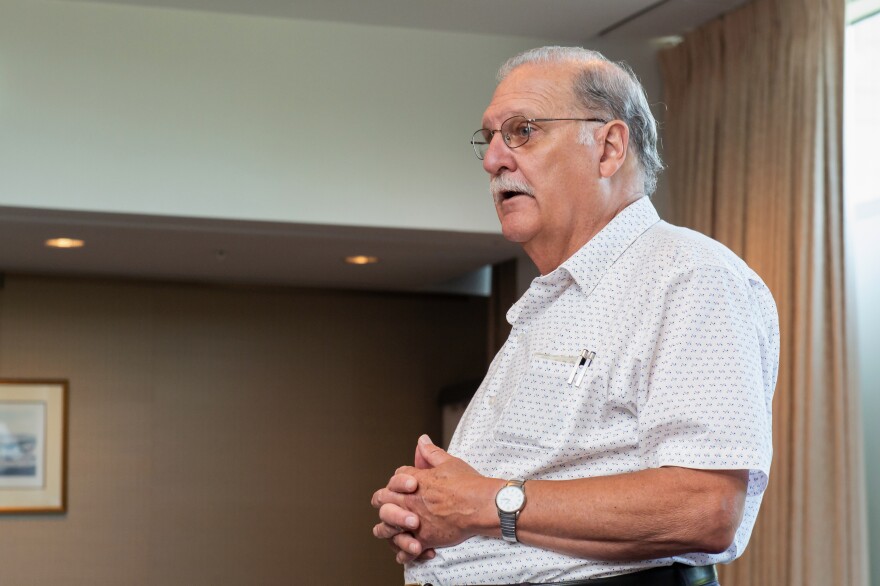For some Virginians, the idea of cities being surrounded by — but not a part of — a neighboring county can be aggravating. And for transplants, it might just be confusing.
Harry Gewanter’s a semi-retired pediatrician who moved to Richmond in 1983 from Rochester, New York. He — and several others — asked us to figure out where the arrangement springs from.
“What I've seen over the years is, in fact, you have power brokers who can move across jurisdictional lines to get things that worked best for them,” Gewanter said. “And not for the region.”
Chuck Conway framed the question a bit differently. He wondered if the structure of Virginia's government keeps localities from working together to attract new businesses — like professional sports.
“How does Oklahoma City have a basketball team — a professional basketball team — and yet one professional team doesn't exist in the commonwealth?” Conway asked.
In mid-December, Virginia officials and representatives of Monumental Sports & Entertainment held a press event in Alexandria to announce a $2-billion proposal to move the Washington Wizards and Capitals. Whether the Commanders leave D.C. or stay put is still being discussed.

The city-county arrangement in Virginia isn’t widely used in the U.S. Baltimore, Carson City, Nevada, as well as a handful of others are independent from their surrounding counties. Having this sort of arrangement doesn’t mean cities and counties can’t — or don’t — work together.
“There's nothing that prohibits any level of cooperation,” according to Brandy Faulkner, a Virginia Tech political science professor. “It's just that the city's charters declare them to be independent and autonomous entities with, of course, limited powers. And that [city] charter will spell out specifically, ‘OK, here are the parameters in which you can operate.’”
Local governments in Virginia do form partnerships to focus on a specific regional need. A lot of times, these are economic development projects, like the Greater Richmond Partnership or InvestSWVA — where Tazewell, Wise and other Southwest Virginia counties work with private partners on economic issues. There’s also the Central Virginia Transportation Authority.
But the commonwealth’s system can lead to localities butting heads.
“Virginia is always unique,” Faulkner said. “Sometimes, you'll see a town almost at war with a county that is trying to push it in one direction, and the town might be resisting. That happens. But that's part of any democratic process of decision making, right?”
Like many things in Virginia, this all goes back to Europe: England, Ireland and Scotland had counties. And since there were only sparse populations of Europeans in Virginia during the colonial period, county governments were set up to provide some structure for rural living. Over time, the population and its needs changed.
“The demands that people had and the needs that people had in urban areas are so different that the General Assembly created this other form of government, the city,” said Brent Tarter, who retired from the Library of Virginia in 2010. He’s written several books on the state's history — including one on the various versions of the Virginia Constitution, aptly called Constitutional History of Virginia.

“Norfolk and Williamsburg — that were chartered before the Revolution — had their own very, very limited municipal governments,” he continued. “But as the cities grew in size throughout the 19th century, the General Assembly individually authorized municipal governments in the towns and cities to exercise more authority.”
Virginia’s a Dillon Rule state, which means municipalities are limited to the powers that are granted by the General Assembly. It’s why the city of Richmond needs to ask the legislature for permission to change its charter.
Local governments were created to provide necessary infrastructure and services, like a court system or sewers. There’s little chance lawmakers from a few hundred years ago could have foreseen the needs of a modern local government.
“This is an accident,” Tarter said about how powers for cities and counties developed in Virginia. “It just happened. And nobody planned it. … And because every other state in the country has a very different system, people who move here are stumped. And people who live here think it's normal.”
One thing Tarter said he’d change is how local school board members are selected. In some places — like Hanover County — they’re appointed by other elected officials. And in November, Hanover voters rejected a proposal to elect its school board. In other places — like the city of Charlottesville — they’re directly elected.
Tarter said it’d be nice to have statewide uniformity. But school boards might just be another unique arrangement Virginia lives with.
“All of these things are negotiated over time,” Faulkner said, “which also lets us know it can change for the future.”
She said there hasn’t been a “large-scale movement” to change how Virginia cities and counties function. But as people’s actions transform the environment and technology makes outlandish ideas seem attainable, Virginia’s needs will continue to change.
This story was produced as part of the new VPM News series Curious Commonwealth.



